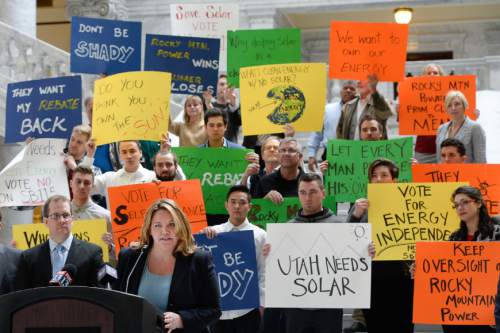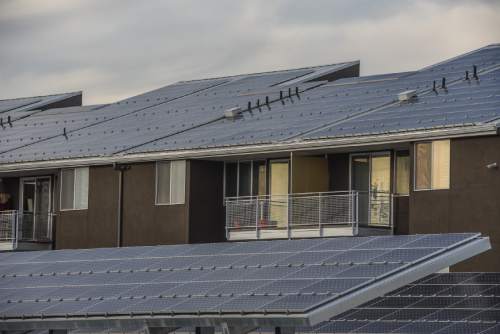This is an archived article that was published on sltrib.com in 2016, and information in the article may be outdated. It is provided only for personal research purposes and may not be reprinted.
Advocates' hopes for an unexpected air quality victory were raised, then dashed Thursday night when the Utah House reversed its decision to reject Rocky Mountain Power's STEP legislation, with representatives saying they'd come to a new understanding of the bill they'd voted down just hours before.
SB115 — which would restructure electrical rates and provide funding for Rocky Mountain Power's Sustainable Transportation and Energy Plan and a rainy day fund for the utility, while offering several environmental perks — passed 46-26 on its second vote, which moved quickly and with little discussion after a recess for dinner. The bill had earlier failed 33-40.
Matt Pacenza, executive director of environmental advocacy group HEAL Utah, said the bill's return to the House floor seemed "a little underhanded."
"Listening to the debate in the House, it's just incredibly clear the legislators do not understand what this bill does," he said, "and it's also really clear to me that Rocky Mountain Power told people what they wanted to hear."
Pacenza said Rocky Mountain Power was also successful in defusing the broad opposition that greeted the bill's initial introduction.
"Rocky Mountain Power ran an excellent campaign," he said. "They leveraged their influence, sowed a bunch of disinformation, and they succeeded, so it's a lesson in politics, I guess."
Rocky Mountain Power President and CEO Cindy Crane released a statement after the bill's passage, saying: "Our customers have told us that they want reasonably priced electricity but also want clean energy options. We worked with legislators and community leaders to refine the STEP bill so we could accomplish that goal."
Prior to the first vote, the bill's sponsors made several amendments, giving the Public Service Commission — the three-member body that oversees utilities in Utah — more leeway in deciding which portions of SB115 it would ultimately implement. But the amendments stopped just short of allowing the Public Service Commission to review the utility's request to pass 100 percent of costs that exceed the company's initial projections on to customers, after opponents complained that such a change would upset the balance of the bill.
Rocky Mountain Power projects its fuel and power-purchasing costs on an annual basis, and reports its actual costs one year later. Currently, if the company's costs are higher than projected, 70 percent of the overage is passed on to ratepayers. The other 30 percent is absorbed by the company.
Company representatives argue that passing all overages to ratepayers will help the utility manage costs and free it up to explore experimental energy technologies.
Prior to the second vote, Rep. Ken Ivory, R-West Jordan, said the restructuring is necessary because energy prices have become unstable and difficult to predict accurately due to the "war on coal."
"Under coal, costs were more certain," he said. "Now that certainty is gone. Their certainty has been completely ripped out from under them, through no choice of their own."
Ivory voted in favor of the bill both times.
Rocky Mountain Power, which Pacenza said mounted a sizable lobbying effort in the session's final hours, holds financial sway within Utah politics.
Bill sponsor Sen. Stuart Adams, R-Layton, received $1,000 from Rocky Mountain Power last fall. Overall, the company donated $48,000 to Utah politicians last year, a nonelection year, and $79,000 in 2014, according to campaign finance disclosures.
Overall, Pacenza said, he was disappointed by the session's final outcome for air quality. The state's decision to fund a $53 million coal port in California, the STEP reconsideration, and the final outcome for the revision of the state's building codes were all steps backward for the state, he said.
Twitter: @EmaPen —
House members who changed their no vote to yes during the reconsideration of SB115:
Scott Chew, R-Jensen
LeVar Christensen, R-Draper
Jack Draxler, R-North Logan
Gage Froerer, R-Huntsville
Kay McIff, R-Richfield
Merrill Nelson, R-Grantsville
Lee Perry, R-Perry
Val Peterson, R-Orem
Scott Sandall, R-Tremonton
Dean Sanpei, R-Provo
Robert Spendlove, R-Sandy
Jon Stanard, R-St. George
John Westwood, R-Cedar City
—
House members who changed their yes vote to no during the reconsideration of SB115:
Susan Duckworth, D-Magna
Eric Hutchings, R-Kearns





